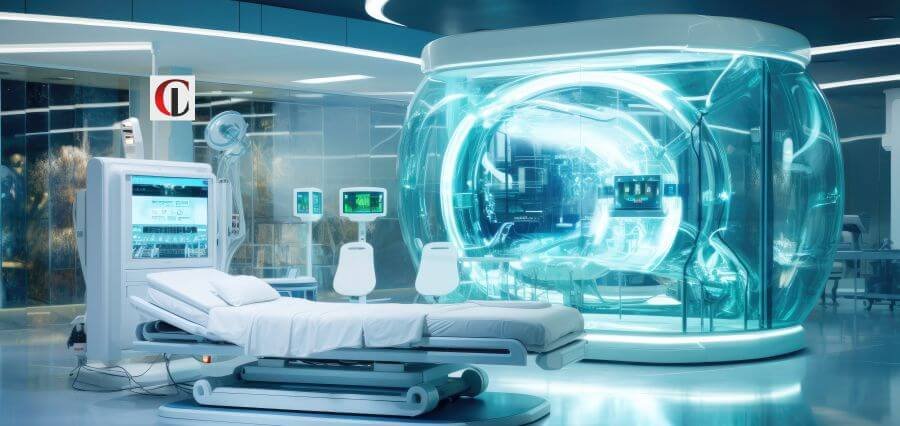The healthcare industry is undergoing a dramatic transformation, with groundbreaking innovations reshaping the way medical care is delivered and experienced. From cutting-edge technologies like telemedicine and artificial intelligence to advancements in wearable health devices and gene editing, these innovations are pushing the boundaries of what’s possible in medicine. This article offers glimpses on how health industry pioneers are not only revolutionizing medical solutions but also paving the way for a more efficient, personalized, and sustainable healthcare future.
Telemedicine:
Telemedicine has emerged as one of the most significant innovations in healthcare in recent years, particularly accelerated by the COVID-19 pandemic. This technology allows patients to consult healthcare professionals remotely via video calls, phone calls, or online messaging. By eliminating the need for in-person visits, telemedicine has expanded access to healthcare, especially in underserved rural areas where medical professionals are in short supply.
Telemedicine is also proving invaluable in providing continuous care for patients with chronic conditions. Patients can monitor their health remotely, share real-time data with healthcare providers, and receive guidance without needing to travel to a clinic. This not only improves patient convenience but also helps reduce healthcare costs by avoiding unnecessary hospital visits. As telemedicine technologies evolve, the potential for integrating artificial intelligence (AI) and machine learning to personalize care continues to grow, bringing further precision to remote healthcare.
Artificial Intelligence and Machine Learning:
Artificial intelligence (AI) and machine learning (ML) are rapidly transforming medical solutions, particularly in the areas of diagnostics, personalized medicine, and drug development. AI systems are now capable of analyzing vast amounts of medical data—such as images, genetic information, and clinical records—to identify patterns and make accurate predictions.
In diagnostics, AI-powered tools have been developed to detect diseases such as cancer, heart conditions, and neurological disorders. For example, AI algorithms trained on medical imaging data can identify tumors in X-rays or MRIs more quickly and accurately than human radiologists. This enables early diagnosis, which is critical for improving patient outcomes, especially in conditions like cancer.
In personalized medicine, AI is being used to analyze genetic data to tailor treatments to individual patients. By understanding a patient’s genetic makeup, healthcare providers can recommend therapies that are more likely to be effective, reducing trial-and-error approaches and improving treatment efficacy. AI’s ability to predict how patients will respond to specific drugs is also streamlining the drug development process, making it faster and more cost-efficient.
Wearable Health Technology:
Wearable health technology has become increasingly popular in recent years, offering patients a way to actively manage their health. Devices like fitness trackers, smartwatches, and medical-grade wearables are providing continuous monitoring of vital signs, including heart rate, blood pressure, blood glucose levels, and oxygen saturation. These devices enable real-time data collection, allowing individuals to make informed decisions about their health.
Wearable technology also plays a significant role in chronic disease management. For patients with conditions like diabetes or heart disease, continuous monitoring can detect potential issues early, allowing for timely interventions. Furthermore, wearables can integrate with telemedicine platforms, ensuring that healthcare providers are kept up to date on a patient’s health status.
One of the most promising aspects of wearable health technology is its potential to shift healthcare from reactive to proactive. Instead of waiting for symptoms to appear, patients can monitor their health continuously and intervene before problems escalate. This preventive approach has the potential to significantly reduce healthcare costs and improve overall health outcomes.
3D Printing:
3D printing technology is another innovation that has made a significant impact on the healthcare industry. Through additive manufacturing, medical professionals can create customized prosthetics, implants, and even tissue scaffolds tailored to individual patients. This level of personalization offers better comfort, fit, and functionality, improving the overall patient experience.
3D printing is also being utilized in surgical planning. Surgeons can create 3D models of a patient’s anatomy from imaging data, which allows for better visualization and planning before performing complex procedures. This technology has been particularly transformative in fields such as orthopedics and plastic surgery, where precision is critical for successful outcomes.
Furthermore, 3D printing is facilitating the development of new medical devices and tools. Instead of relying on mass-produced items, healthcare providers can design and print unique devices tailored to the needs of specific patients. This not only improves the quality of care but also reduces the time and costs associated with traditional manufacturing methods.
Biotechnology and Gene Editing:
Biotechnology is at the forefront of revolutionizing medical treatments, particularly in the area of gene editing. Technologies like CRISPR-Cas9 are enabling scientists to modify genes with unprecedented precision. This has opened the door for potential cures for genetic disorders that were once considered untreatable, such as sickle cell anemia, cystic fibrosis, and certain types of inherited blindness.
Gene editing holds the promise of not only curing genetic diseases but also preventing them from being passed down to future generations. By editing the DNA of embryos or somatic cells, researchers can eliminate genetic mutations, offering hope for families affected by hereditary conditions. While the technology is still in its early stages, its potential to reshape the treatment of genetic disorders is immense.
Moreover, biotechnology is driving the development of personalized therapies, such as CAR-T cell therapy for cancer. This treatment involves modifying a patient’s own immune cells to target and destroy cancer cells, offering a more effective and targeted approach than traditional chemotherapy or radiation.
Conclusion:
The healthcare industry is experiencing a profound transformation driven by groundbreaking innovations that enhance patient care, increase accessibility, and reduce costs. From telemedicine revolutionizing access to healthcare services, to AI and machine learning improving diagnostics and drug development, these technologies are enabling more personalized and efficient treatments. Wearable health devices are shifting the focus from reactive to proactive care, while 3D printing and biotechnology are advancing medical personalization and the potential for genetic cures.

